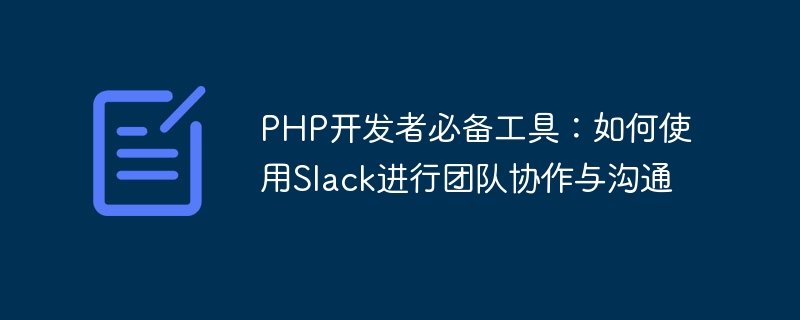

Must-have tools for PHP developers: How to use Slack for team collaboration and communication
With the development of the Internet, the software development industry is also growing. As a PHP developer, having an efficient tool is essential for team collaboration and communication. This article will introduce how to use Slack for team collaboration and communication, as well as some specific code examples.
Slack is a powerful team collaboration tool that provides real-time chat, channel management, file sharing and other functions, and is suitable for cross-department and cross-time zone team collaboration. As PHP developers, before using Slack, we need to register a Slack team. After registration, we can create multiple channels for different projects or topics to facilitate collaboration and communication among team members.
The following are some specific code examples using Slack:
$webhookUrl = 'https://hooks.slack.com/services/xxxxxxxxx/xxxxxxxxx/xxxxxxxxx'; // 替换为你的Webhook URL
$message = 'Hello, PHP Developers!';
$data = array('text' => $message);
$dataString = json_encode($data);
$ch = curl_init($webhookUrl);
curl_setopt($ch, CURLOPT_CUSTOMREQUEST, "POST");
curl_setopt($ch, CURLOPT_POSTFIELDS, $dataString);
curl_setopt($ch, CURLOPT_RETURNTRANSFER, true);
curl_setopt($ch, CURLOPT_HTTPHEADER, array(
'Content-Type: application/json',
'Content-Length: ' . strlen($dataString)
));
$result = curl_exec($ch);
curl_close($ch);$data = json_decode(file_get_contents('php://input'), true);
if(isset($data['event']['type']) && $data['event']['type'] == 'message'){
$channel = $data['event']['channel'];
$message = $data['event']['text'];
// 在这里处理消息
// ...
http_response_code(200);
header('Content-Type: application/json');
echo json_encode(array('ok' => true));
exit;
}Through the above code example, we can use Slack's Web API to send messages to the specified channel, and receive messages in the Slack channel through Slack's event subscription function and process them accordingly.
In addition to the above examples, Slack also provides a rich API and other functions that developers can extend and customize according to their own needs. Through the powerful functions of Slack, PHP developers can communicate with team members in real time, share code, solve problems, and improve work efficiency.
Summary:
As a PHP developer, with the help of Slack, a team collaboration tool, you can better manage projects and promote team communication and collaboration. By rationally using Slack's functions, we can improve the team's work efficiency and strengthen the team's collaborative spirit. We hope that the code examples provided in this article can help PHP developers use Slack more flexibly and achieve efficient team collaboration and communication.
The above is the detailed content of Essential tools for PHP developers: How to use Slack for team collaboration and communication. For more information, please follow other related articles on the PHP Chinese website!




